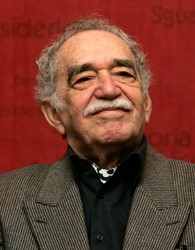Gabriel García Márquez grew up in a home filled with storytelling and the supernatural. His seminal work of fiction, “One Hundred Years of Solitude,” transformed his birthplace of Aracataca, Colombia, into the magical town of Macondo. García Márquez ultimately won the Nobel Prize in Literature for his body of work.
Gabriel Garcia Marquez’s Early Days
Gabriel García Márquez was born on March 6, 1927, in a small Colombian town called Aracataca.
During his early childhood, García Márquez was brought up by his grandparents, who were both storytellers. His grandmother shared her superstitions and folk beliefs with the boy, while maintaining what García Márquez later described as “a brick face.” In fact, her deadpan descriptions of the supernatural ultimately inspired García Márquez’s own writing style.
The young writer’s life was also influenced by the turbulent political and social circumstances that defined Colombia; the dueling Liberal and Conservative parties kept the nation in a constant state of upheaval.
The author began writing seriously while studying law at the Universidad Nacional in Bogotá. He was not interested in a legal career, but had been encouraged to pursue the topic by his family. García Márquez was a poor student, preferring to spend his time reading and writing.
Eventually, García Márquez abandoned his studies completely, turning to journalism for financial support as he pursued creative writing. He had early success publishing short stories in the Bogotá newspaper El Espectador.
Sources in this Story
- The Independent: Gabriel Garcia Marquez: Author and journalist who led the South American literary boom and won the Nobel Prize
- The Paris Review: Gabriel García Márquez, The Art of Fiction No. 69
- HarperCollins Publishers: Gabriel Garcia Marquez
- The Nobel Foundation: The Nobel Prize in Literature 1982— Presentation Speech
- NPR: Commentary: Meeting Gabriel Garcia Marquez
- The BBC: Gabriel García Márquez turns 80
- The Washington Post: For García Márquez, a Magical Homecoming
- Time: The Miraculous Life of Gabriel García Márquez
Garcia Marquez’s Notable Accomplishments
Although García Márquez would eventually write many novels, the transition from short-story writing was not easy. His first novella was rejected by a publisher, so he abandoned it.
In the meantime, García Márquez wrote and edited for a series of newspapers in Latin America to support his young family, which included his wife, Mercedes, and their two sons. One day, while on holiday with his family, García Márquez had an artistic epiphany. The family returned home so that he could begin writing immediately. After a year and a half of scribbling and heavy smoking, García Márquez produced “One Hundred Years of Solitude.” The work was an instant success.
García Márquez continued to write prolifically. Other notable books include, “Love in the Time of Cholera,” “The Autumn of the Patriarch,” “Chronicle of a Death Foretold,” the memoir, “Living to Tell the Tale and, most recently, “Memories of My Melancholy Whores.”
In 1982 García Márquez was awarded the Nobel Prize in Literature for his body of work. In his presentation speech, the Permanent Secretary of the Swedish Academy said that García Márquez’s writing “reflects a continent and its human riches and poverty. Perhaps more than that: a cosmos in which the human heart and the combined forces of history, time and again, burst the bounds of chaos-killing and procreation.”
The Man and His Work
- “One Hundred Years of Solitude”
- “Chronicle of a Death Foretold”
- “Love in the Time of Cholera”
- “Memories of My Melancholy Whores”
- “Living to Tell the Tale”
The Rest of The Story
García Márquez attributes his groundbreaking artistic epiphany to his grandmother’s storytelling: he realized that to create effective fiction, he needed to believe the stories he was telling as if they were completely real—as his grandmother always had.
Throughout his life, García Márquez maintained a sense of the imaginary in his daily life. Twenty years ago, NPR reporter Katie Davis experienced this perspective firsthand: García Márquez, who misunderstood her name when first introduced, insisted on calling her “Vicky” throughout the interview and would not call her by her real name, even when corrected.
According to Davis, García Márquez has a habit of leaving each reporter he meets with a gift: “something original, so they didn’t go away with the same old stuff.” For Davis, this meant unwittingly assuming an alter ego during the interview process. When she was finished talking with García Márquez , he signed her copy of “One Hundred Years of Solitude,” “To Vicky… with a kiss, Gabo.”
García Márquez’s Colombia hometown celebrated his 80th birthday in 2007 with 80 cannon salvos and flocks of paper and metal butterflies. (García Márquez, who lived in Mexico at the time, did not attend any of the festivities, although he did travel to Aracataca three months later; it was his first visit in 25 years.) Spain honored the author with a marathon reading of “One Hundred Years of Solitude”; writers, actors and politicians gathered to read the book cover to cover, a process that took nearly 20 hours.
García Márquez died April 17, 2014, from cancer. He was 87.
This article was originally written by Isabel Cowles; it was updated January 15, 2017.











